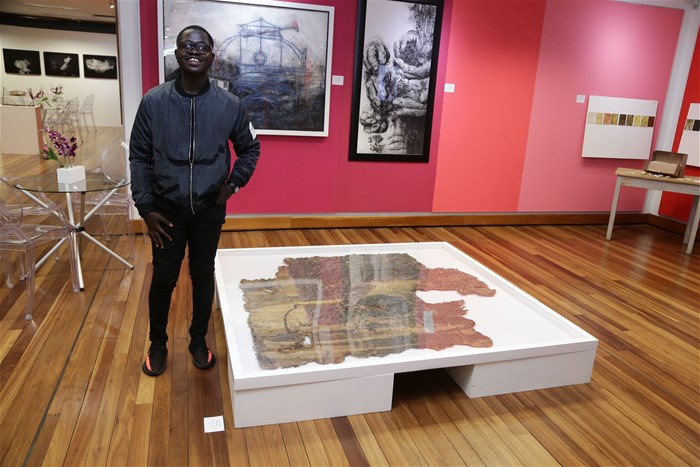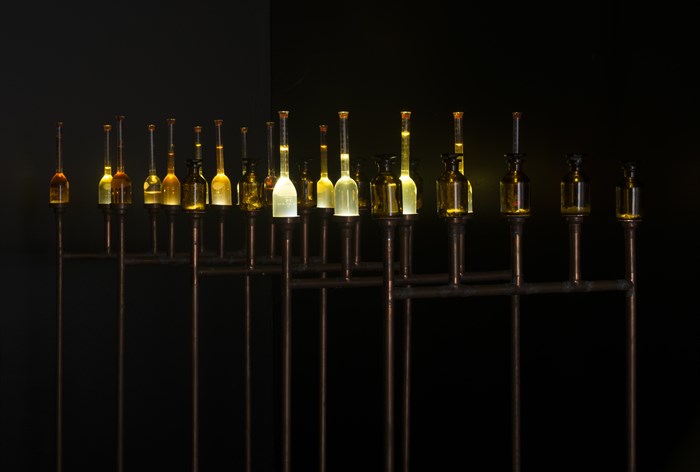
Top stories






LifestyleWhen to stop Googling and call the vet: Expert advice on pet allergies from dotsure.co.za
dotsure.co.za 16 Feb 2026
More news


Marketing & Media
Ads are coming to AI. Does that really have to be such a bad thing?













Kirsten won the overall Absa L’Atelier Award for her installation Embodiment. Having grown up, and continuing to live, with various medical conditions, she feels her body has become an instrument of the medical fraternity. This work, comprising various fluids that represent the ephemeral nature of her body, sought to strengthen and dignify the artist’s physical body in the face of this perceived objectification.

Lila scooped the Gerard Sekoto Award for Self-Titled, a series of self-portraits related to her name, Philiswa, which means ‘be healed’. The artist used her name to explore the nuances of language, meaning, and experiences of individualism as recognisable or familiar to collective frameworks of culture, mainly in isiXhosa.
The three Merit Awards winners this year were Gillian Abe of Uganda (Seat of Honour), Henry Obeng of Ghana (Recycle Frame 2), and Kirsten Eksteen of South Africa (Patterns and Pattern Body).
These three artists, along with overall winner Marguerite Kirsten, Carli Bassin (SA) (Shaped), Lemmeze Davids (SA) (Thank you for my lunch), Christiaan Kritzinger (SA) (Meltdown: new aesthetics in old landscapes), Ayo Akinwande (Nigeria) (Shrine), Lodewyk Barkhuizen (SA) (Hat disguised as map), and Sikelele Damane (SA) (Toyi, Toyi, Act 1) were selected as the top 10 finalists for 2018.
The Absa L’Atelier Awards have become a touchstone for the concerns consuming young people on the continent. Works referencing hair styles as a form of expression, identity, and a site of contestation were prominent in previous years and remained important to a number of this year’s entrants, such as Nonkululeko Sibande, Lebohang Motaung (both from South Africa) and Darlyne Komukama (Uganda).
Some artworks offered insights into the particular conditions and contexts from the artist’s countries of origin – constant power outages in Lagos, Nigeria, accounted for the unexpected metaphor between electricity generators and religious shrines by Ayo Akinwande, for example. Pressing political issues regarding land ownership in South Africa surfaced in works by Vianca Malan, Mhlonishwa Chiliza, Karla Nixon and Ciara Struwig, while forced removals and land ownership were mirrored in Bya'bazzukulu (For Grandchildren) by Donald Wasswa.

Challenging fixed gender roles was again a prominent theme, as seen in the work of Mzoxolo Mayongo and Matimu Lloyd Maluleke. These artworks affirm not only the dominance of sociopolitical discourse but the artists’ perceptions that contemporary practice is irretrievably tied to addressing them.
Showcasing young African artists
The Absa L’Atelier art competition is jointly sponsored by Absa and the South African National Association for the Visual Arts (Sanava) and is one of the longest-running visual arts competitions on the African continent. It was established in South Africa 33 years ago, but in recent years has been expanded to include a number of other African countries in order to reach more young artists and further the unparalleled opportunities it affords those who participate in the competition.

“The L’Atelier Awards embrace emerging artists from our continent. This competition has become the voice and lens through which we experience and access various societies, and has rendered the borders between our country and the rest of Africa, porous,” says Avitha Sooful, president of Sanava.
This year was the first time that the awards were extended to include Nigeria and Namibia. A total of 12 countries now participate in the competition which, aside from Nigeria and Namibia, include South Africa, Botswana, Ghana, Zambia, Kenya, Uganda, Tanzania, Mauritius, Seychelles, and Mozambique.